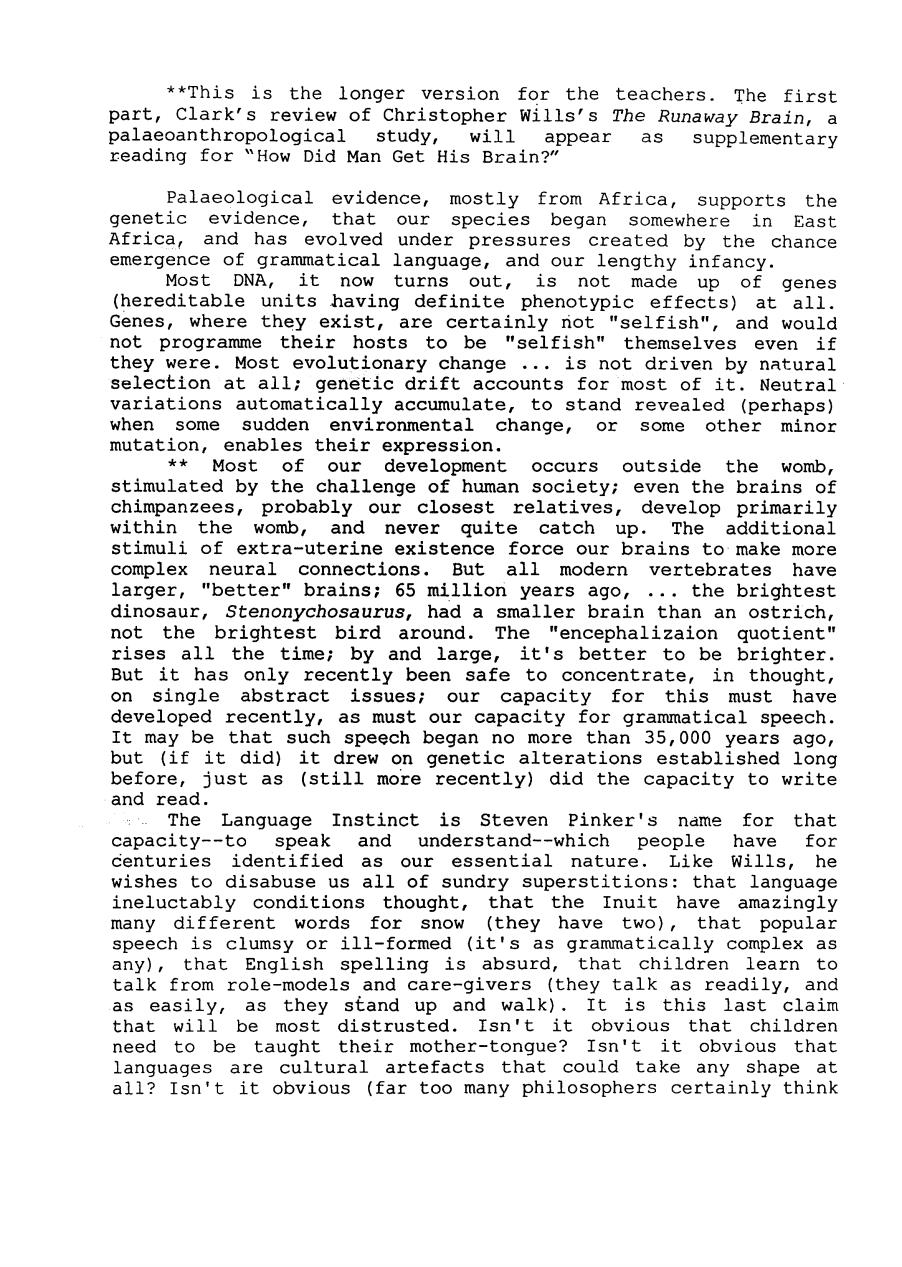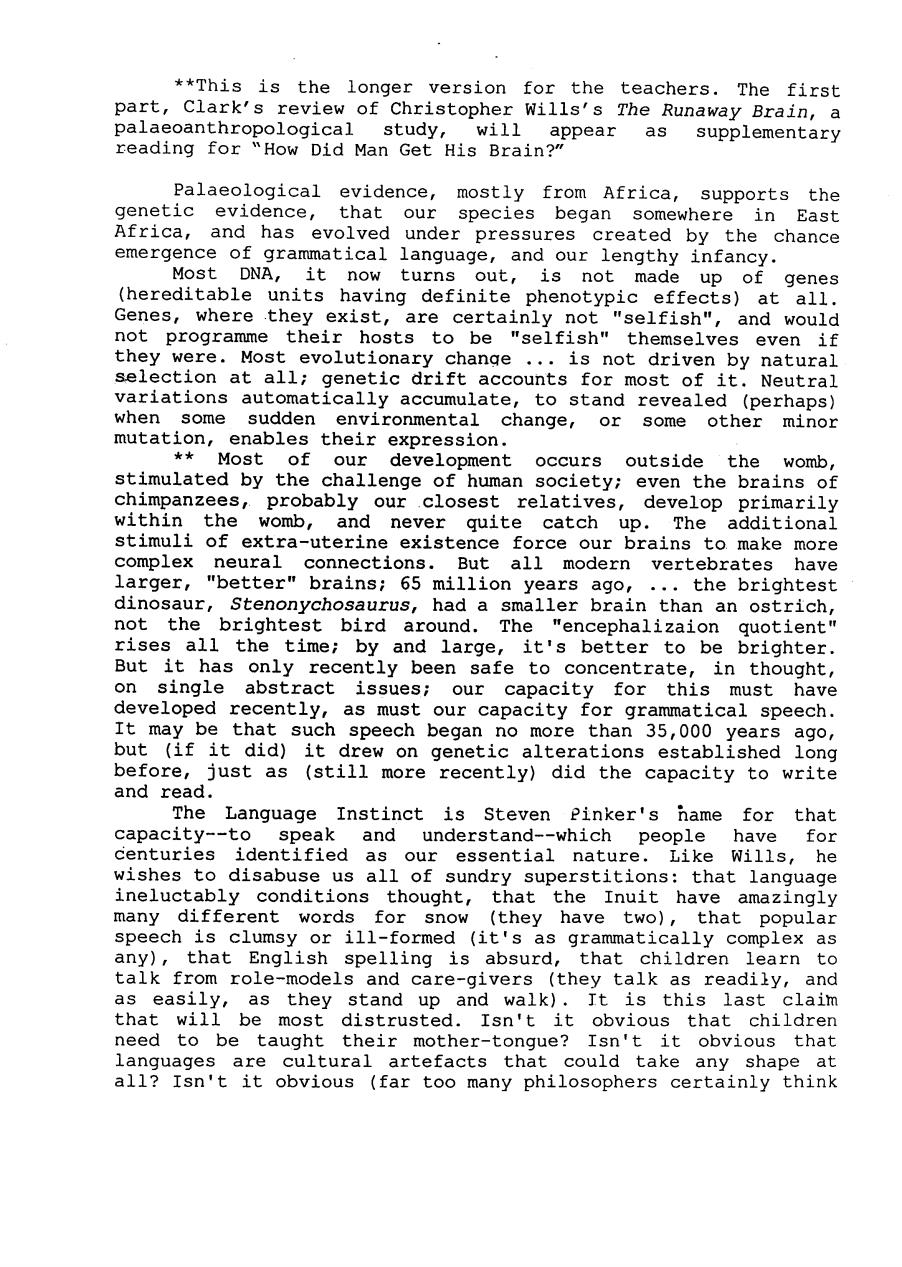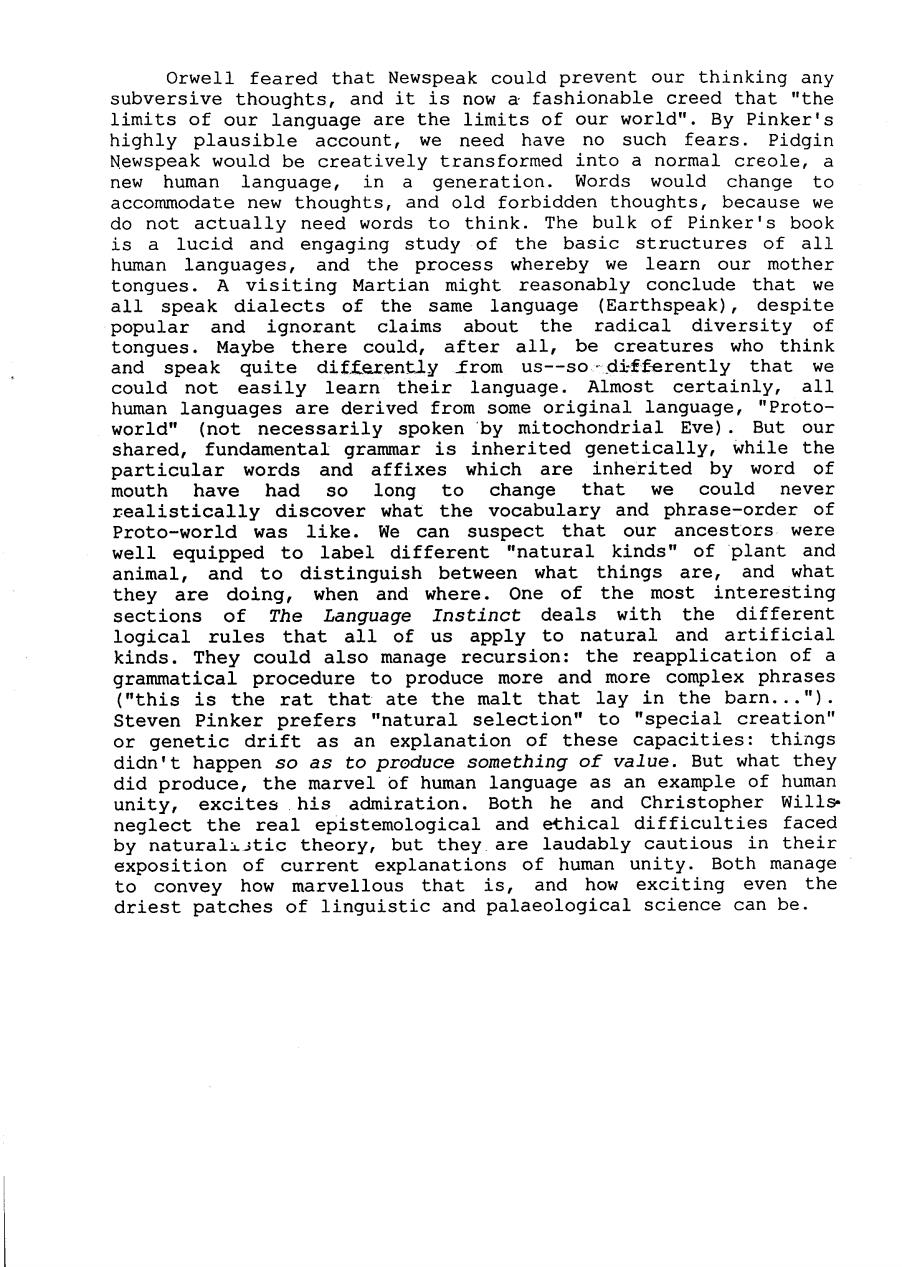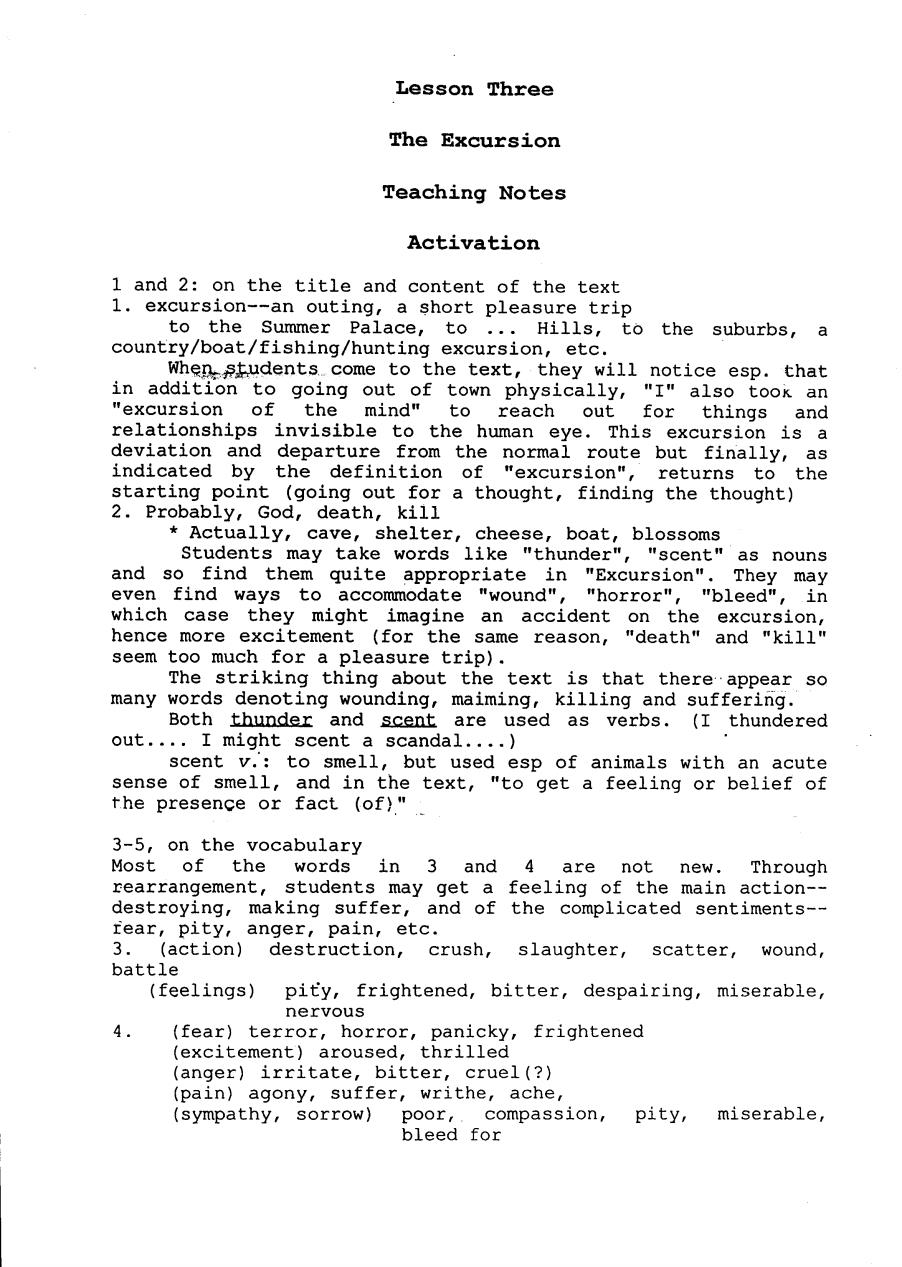
**This is the longer version for the teachers.The first part,clark's review of Christopher Wills's The Runaway Brain,a palaeoanthropological study,will appear as supplementary reading for "How Did Man Get His Brain?" Palaeological evidence,mostly from Africa,supports the genetic evidence,that our species began somewhere in East Africa,and has evolved under pressures created by the chance emergence of grammatical language,and our lengthy infancy. Most DNA,it now turns out,is not made up of genes (hereditable units having definite phenotypic effects)at all. Genes,where they exist,are certainly not "selfish",and would not programme their hosts to be "selfish"themselves even if they were.Most evolutionary change ..is not driven by natural selection at all;genetic drift accounts for most of it.Neutral variations automatically accumulate,to stand revealed (perhaps) when some sudden environmental change,or some other minor mutation,enables their expression. *Most of our development occurs outside the womb, stimulated by the challenge of human society;even the brains of chimpanzees,probably our closest relatives,develop primarily within the womb,and never quite catch up.The additional stimuli of extra-uterine existence force our brains to make more complex neural connections.But all modern vertebrates have larger,"better"brains;65 million years ago,···the brightest dinosaur,Stenonychosaurus,had a smaller brain than an ostrich, not the brightest bird around.The "encephalizaion quotient" rises all the time;by and large,it's better to be brighter. But it has only recently been safe to concentrate,in thought, on single abstract issues;our capacity for this must have developed recently,as must our capacity for grammatical speech. It may be that such speech began no more than 35,000 years ago, but (if it did)it drew on genetic alterations established long before,just as (still more recently)did the capacity to write and read. The Language Instinct is Steven Pinker's name for that capacity--to speak and understand--which people have for centuries identified as our essential nature.Like Wills,he wishes to disabuse us all of sundry superstitions:that language ineluctably conditions thought,that the Inuit have amazingly many different words for snow (they have two),that popular speech is clumsy or ill-formed (it's as grammatically complex as any),that English spelling is absurd,that children learn to talk from role-models and care-givers (they talk as readily,and as easily,as they stand up and walk).It is this last claim that will be most distrusted.Isn't it obvious that children need to be taught their mother-tongue?Isn't it obvious that languages are cultural artefacts that could take any shape at all?Isn't it obvious (far too many philosophers certainly think

**This is the longer version for the teachers.The first part,clark's review of Christopher Wills's The Runaway Brain,a palaeoanthropological study,will appear as supplementary reading for "How Did Man Get His Brain?" Palaeological evidence,mostly from Africa,supports the genetic evidence,that our species began somewhere in East Africa,and has evolved under pressures created by the chance emergence of grammatical language,and our lengthy infancy. Most DNA,it now turns out,is not made up of genes (hereditable units having definite phenotypic effects)at all. Genes,where they exist,are certainly not "selfish",and would not programme their hosts to be "selfish"themselves even if they were.Most evolutionary change ..is not driven by natural selection at all;genetic drift accounts for most of it.Neutral variations automatically accumulate,to stand revealed (perhaps) when some sudden environmental change,or some other minor mutation,enables their expression. *Most of our development occurs outside the womb, stimulated by the challenge of human society;even the brains of chimpanzees,probably our closest relatives,develop primarily within the womb,and never quite catch up.The additional stimuli of extra-uterine existence force our brains to make more complex neural connections.But all modern vertebrates have larger,"better"brains;65 million years ago,...the brightest dinosaur,Stenonychosaurus,had a smaller brain than an ostrich, not the brightest bird around.The "encephalizaion quotient" rises all the time;by and large,it's better to be brighter. But it has only recently been safe to concentrate,in thought, on single abstract issues;our capacity for this must have developed recently,as must our capacity for grammatical speech. It may be that such speech began no more than 35,000 years ago, but (if it did)it drew on genetic alterations established long before,just as (still more recently)did the capacity to write and read. The Language Instinct is Steven pinker's hame for that capacity--to speak and understand--which people have for centuries identified as our essential nature.Like Wills,he wishes to disabuse us all of sundry superstitions:that language ineluctably conditions thought,that the Inuit have amazingly many different words for snow (they have two),that popular speech is clumsy or ill-formed (it's as grammatically complex as any),that English spelling is absurd,that children learn to talk from role-models and care-givers (they talk as readily,and as easily,as they stand up and walk).It is this last claim that will be most distrusted.Isn't it obvious that children need to be taught their mother-tongue?Isn't it obvious that languages are cultural artefacts that could take any shape at all?Isn't it obvious (far too many philosophers certainly think

so)that thought requires speech,and speech requires a public language-using community to give it meaning? Pinker provides evidence that three-year-olds have already worked out complex rules of grammar,well before they can cope with traffic-lights or with logical argument.They can do this so easily because all human languages have a common structure grounded in our brains,which the child needs only to fill in with local vocabulary,and choices about phrase order.Pidgins may begin as fragmentary,inconsistent codes;children who are brought up to speak them turn them into creoles,"bona fide languages,with standardised word orders and grammatical markers".There are no primitive languages,in Papua New Guinea, among "the lover orders",or in the mouths of three-year-olds. However odd other people sound,they speak "grammatically",in sentences.well formed according to consistent rules in their own particular dialect,and those rules are every bit as neat as those of Standard English."Broken-off sentence fragments,slips of the tongue and other forms of word salad"do occur--more often in the proceedings of academic conferences than in casual speech.There are no "bad languages",any more than there are "bad genes". That children often invent their own languages,or reinvent their mother tongues need come as no surprise.Pinker himself perhaps provides some evidence against his claim that we need not "teach"our children (any more than we need to teach them to sit up and crawl)."Motherese",the dialect that most of us will use to infants,may only convey the melody of the language that the children are to learn (which melody is apparently also audible in the womb),but that melody will help the child to speak.Those profoundly deaf,or feral,children who did not learn the local language in infancy,did not invent a tongue from scratch,and usually fail to learn one later in life.But this concession need not alter the basic point:language is instinctual in the human species,even if its regular reinvention often needs to be cued or sparked by an existing speech-community.It is instinctual,and seems to have no special connection to intelligence;some very stupid or very disturbed people speak fluently,even imaginatively;some very intelligent people can hardly speak at all.There are apparently families many of whose members are "language-impaired",who none the less cope with social life.Harlan Miller's "Wahockies" (imagined in The Great Ape Project [1993]as a community of human beings without the power to speak,and therefore as a guide to how we should treat other anthropoids who cannot speak) are apparently real possibilities..For much the same reason (that the language instinct is a capacity distinct from intelligence or sentience),it is foolish to expect that even our closest anthropoid relatives will ever learn to speak. Foolish,and unnecessary;if people can think,intelligently, without language,so may other animals

Orwell feared that Newspeak could prevent our thinking any subversive thoughts,and it is now a fashionable creed that "the limits of our language are the limits of our world".By Pinker's highly plausible account,we need have no such fears.Pidgin Newspeak would be creatively transformed into a normal creole,a new human language,in a generation.Words would change to accommodate new thoughts,and old forbidden thoughts,because we do not actually need words to think.The bulk of Pinker's book is a lucid and engaging study of the basic structures of all human languages,and the process whereby we learn our mother tongues.A visiting Martian might reasonably conclude that we all speak dialects of the same language (Earthspeak),despite popular and ignorant claims about the radical diversity of tongues.Maybe there could,after all,be creatures who think and speak quite differently from us--so-differently that we could not easily learn their language.Almost certainly,all human languages are derived from some original language,"Proto- world"(not necessarily spoken by mitochondrial Eve).But our shared,fundamental grammar is inherited genetically,while the particular words and affixes which are inherited by word of mouth have had so long to change that we could never realistically discover what the vocabulary and phrase-order of Proto-world was like.We can suspect that our ancestors were well equipped to label different "natural kinds"of plant and animal,and to distinguish between what things are,and what they are doing,when and where.One of the most interesting sections of The Language Instinct deals with the different logical rules that all of us apply to natural and artificial kinds.They could also manage recursion:the reapplication of a grammatical procedure to produce more and more complex phrases ("this is the rat that ate the malt that lay in the barn..."). Steven Pinker prefers "natural selection"to "special creation" or genetic drift as an explanation of these capacities:things didn't happen so as to produce something of value.But what they did produce,the marvel of human language as an example of human unity,excites.his admiration.Both he and Christopher wills neglect the real epistemological and ethical difficulties faced by naturalstic theory,but they.are laudably cautious in their exposition of current explanations of human unity.Both manage to convey how marvellous that is,and how exciting even the driest patches of linguistic and palaeological science can be

Lesson Three The Excursion Teaching Notes Activation 1 and 2:on the title and content of the text 1.excursion--an outing,a short pleasure trip to the Summer Palace,to ..Hills,to the suburbs,a country/boat/fishing/hunting excursion,etc. Whenstudents.come to the text,they will notice esp.that in addition to going out of town physically,"I"also took an "excursion of the mind"to reach out for things and relationships invisible to the human eye.This excursion is a deviation and departure from the normal route but finally,as indicated by the definition of "excursion",returns to the starting point (going out for a thought,finding the thought) 2.Probably,God,death,kill Actually,cave,shelter,cheese,boat,blossoms Students may take words like "thunder","scent"as nouns and so find them quite appropriate in "Excursion".They may even find ways to accommodate "wound","horror","bleed",in which case they might imagine an accident on the excursion, hence more excitement (for the same reason,"death"and "kill" seem too much for a pleasure trip). The striking thing about the text is that there appear so many words denoting wounding,maiming,killing and suffering. Both thunder and scent are used as verbs.(I thundered out....I might scent a scandal....) scent v.:to smell,but used esp of animals with an acute sense of smell,and in the text,"to get a feeling or belief of the presence or fact (of)" 3-5,on the vocabulary Most of the words in 3 and 4 are not new.Through rearrangement,students may get a feeling of the main action-- destroying,making suffer,and of the complicated sentiments-- rear,pity,anger,pain,etc. 3.(action)destruction,crush,slaughter,scatter,wound, battle (feelings)pity,frightened,bitter,despairing,miserable, nervous 4. (fear)terror,horror,panicky,frightened (excitement)aroused,thrilled (anger)irritate,bitter,cruel(?) (pain)agony,suffer,writhe,ache, (sympathy,sorrow)poor,compassion,pity,miserable, bleed for